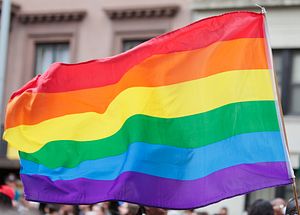For many in Kazakhstan, losing out on the 2022 Winter Olympics bid – especially in such a close vote – was a disappointment. Despite the fact that the Olympics would have likely brought only economic drag and bad press, the country narrowly missed out on the chance to finally shake the image of, and association with, the character of Borat, who has tailed Astana for nearly a decade.
However, there’s one segment of Kazakhstan’s population that likely feels even more disappointed at the decision to award the Winter Games to Beijing. For LGBT individuals in Kazakhstan, the possibility of landing the 2022 Games was one of their main hopes for defending their rights, identity, and safety in Kazakhstan. Earlier this year, the country’s Constitutional Council struck down Kazakhstan’s impending “anti-gay propaganda” law on technical grounds – presumably to comply with regulations required by the International Olympic Committee. At the time, the ruling stood as one of the few bits of good news out of Central Asia in 2015.
Now, though, any external motivation for keeping a Russia-style LGBT crackdown at bay has slipped away. A member of Kazakhstan’s parliament has already said that the draft legislation may well be reintroduced before the year is out, mirroring Kyrgyzstan’s sudden push against its LGBT population.
The timing of the IOC’s decision, and the fallout for Kazakhstan’s LGBT population, coincides with a new report from Human Rights Watch detailing sexual minorities’ struggles in the country. Interviewing nearly two dozen LGBT individuals, the 31-page report, titled “‘That’s When I Realized I Was Nobody’: A Climate of Fear for LGBT People in Kazakhstan,” details a nationwide atmosphere as intensely homophobic as any time in recent memory.
The report didn’t mince words in covering the existing fear: “The LGBT people Human Rights Watch interviewed in Kazakhstan said that fear influences all aspects of their lives—fear that their sexual orientation or gender identity will impede their access to education, employment, and health care; fear of violence while walking down the street; and, too often, dread at the prospect of everyday interactions with intolerant and sometimes psychologically abusive family members.”
To be sure, the Soviet legacy of legalized homophobia plays a large role in shaping the resultant anti-gay views. But HRW also lays much of the blame at the feet of the government. “The Kazakh government’s deafening silence on the human rights of LGBT people, combined with the acerbic anti-gay rhetoric of some members of parliament, has contributed to the social sanctioning of discrimination against people based on their real or perceived sexual orientation and gender identity,” the report notes. And considering Kazakhstan’s recent backslide, there’s little likelihood the government will step in to uphold its pledges anytime soon: “Kazakhstan has long been a country of quiet repression, but since December 2011, when strikes in western Kazakhstan were brought to a violent end, the government’s overall human rights record has significantly worsened.”
While the “anti-gay propaganda” law remains shelved for the moment, the chance to land the 2022 Winter Games seemed the only thing preventing the legislation’s return. Now that the Games have gone elsewhere, Kazakhstan’s LGBT population seems set to suffer the consequences. As HRW researcher Kyle Knight noted, “There is no shortage of homophobia that could motivate others to revive [the anti-LGBT law], and the government has done little to provide LGBT people protection.”
































